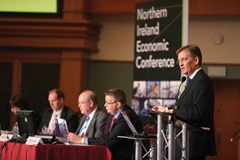Growth for all?
 Policy-makers have only a short time horizon for tackling growing wage inequality, according to Stephen Boyle,
Policy-makers have only a short time horizon for tackling growing wage inequality, according to Stephen Boyle,
Head of Group Economics at RBS, who presented his analysis of the recovery and the squeezed middle.
While many positive signs are appearing in the economic news, Stephen Boyle’s analysis shows that the benefits of the recovery will not be evenly distributed and policy-makers must therefore consider how to make it more equal for householders across society.
He remarked: “This might be a recovery that still relies too heavily on very loose and expansionary monetary policy, and exiting from that extraordinary monetary policy will by no means be straightforward, but the corner has been turned and the economy is recovering.”
Although average living standards (measured by GDP per head) are rising and would rise for some time to come, that did not mean that everyone will benefit.
To illustrate the point, he discussed the finances of the average UK couple earning £31,000 per year between them, paying £4,600 in tax and receiving £5,000 in child benefit. The downturn years have been the first in recorded UK history when people on middle incomes have paid less in tax than they have received in benefits.
Ninety-five per cent of their take-home pay goes on essentials and they are “very vulnerable to something going wrong”. Their purchasing power (real income) is the same as it was in 2003 even though GDP per head has increased in that timeframe.
“The root of this story is a process of rising wage inequality which has been going on for a very long time in the United Kingdom,” Boyle commented, pointing to statistics for 1986-2011. The lowest paid have benefitted from the national minimum wage. On the other hand, higher paid workers have received higher increases in pay.
Causes
This trend is firstly explained by changes in demand. New technology displaces jobs e.g. well-skilled and middle income manual workers in car plants, typing pools in offices. Technology, though, benefits other workers such as doctors, academics and those in the creative industries, who are now more productive than before and see increased demand for their services.
Improved healthcare, coupled with an ageing population, has resulted in greater demand for highly skilled doctors, nurses and other medical practitioners and also greater demand for low paid and low skilled care home workers.
The emergence of South and East Asia, Latin America and the former Soviet bloc has “probably more than doubled” the global labour supply over the last 30 years. The expansion of the EU has increased economic migration into the UK and those workers have “disproportionately competed” in the lower skilled part of the labour market.
“Labour became much more abundant,” he added. “Capital has become relatively scarce so the returns to labour have diminished and the returns to capital have increased.”
This raises the question of why real terms wages have been maintained over the last decade. Statistics for 2002-2003 to 2008-2009 (the latest available) show that the household income increased by around £100 per year. Increases in benefits and tax credits added a further, more substantial, increase of £700 and “cheap and easy” credit was also available.
The timeframe for responding to inequality is short.
“Given the fiscal position of governments across the west – because this doesn’t just affect the UK – the opportunity and the ability to mitigate the effects of wage inequality [is] diminishing rapidly,” he warned.
Without a response, though, wage inequality will feed through into consumption and income inequality, bringing down living standards. Boyle outlined two policy options, based on what people can buy and how much they can earn.
The first is to cut the cost of living by looking at public policies which raise those costs. The UK has had the highest inflation in Western Europe over the last five years.
In England, the planning system makes houses up to 33 per cent more expensive than they would otherwise be. Reducing that burden would, in turn, make a significant contribution. Likewise, planning means that a shop built in England in 2008 is less productive than a shop built in 1966 because developers are normally required to build within towns. This concentration lowers lower economies of scale and the costs are passed on to shoppers.
The second option is to invest in skills and help people into higher skilled jobs that have, so far, not been affected by rising wage inequality, globalisation and technology.
“That’s probably worth doing but there is at least a chance that even that is going to run us into diminished returns,” Boyle stated, “because some of technological changes that are taking place now are going to start to displace the very highly skilled.” Telemedicine allows one doctor to give advice over long distances rather than employing several doctors on site.
In conclusion, he welcomed the recovery but pointed out that the big challenge, to ensure equity and social stability, is: “How do we make sure that as many people as possible can share in the benefits of a growing economy?”
Speaking to agendaNi afterwards, he explained that people on middle and lower incomes “aren’t benefitting fully when there is growth and they’re suffering when there isn’t”. Austerity meant that government transfers and borrowing seemed to be “much less sustainable” than in the past.
“What I really want to do is to get people to start thinking about what you can do – that’s not obviously in the territory of equality and inequality – to start mitigating it.”






